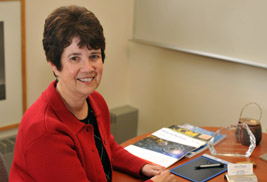Featured Article
New Liquid Crystal-Based Technology Rapidly Detects Multiple Pathogens in Food
Crystal Diagnostics has unveiled a unique food-safety testing system. The novel technology, in development since 2006, uses liquid crystals to detect multiple harmful pathogens in food in a single test, offering significant time savings over the most common testing methods.
Kent State and Carnegie Mellon Receive $250,000 NSF Grant to Advance Computational Research
Posted Oct. 31, 2011
Laura Bartolo, professor and director of the Center for Materials Informatics at Kent State University, will co-lead a project to advance computational research, with funding from the National Science Foundation.
The National Science Foundation (NSF) has awarded a collaborative research grant to Kent State University and Carnegie Mellon University for a project to advance computational research. The $250,000 grant is part of the NSF’s Cyberinfrastructure Training, Education, Advancement and Mentoring for Our 21st Century Workforce program (CI-TEAM).
Laura Bartolo, professor and director of the Center for Materials Informatics at Kent State, and David Yaron, professor of chemistry at Carnegie Mellon, will lead the two-year project. “Cyberinfrastructure is part of NSF’s vision for the 21st century,” Bartolo says. “It plays a critical role in accelerating discovery of new scientific and engineering research.”
The project partners will build an online community for computational research in which undergraduate researchers become a key part of the workforce for carrying out computational projects.
“It’s an honor to be selected to participate in this important research,” says Timothy Moerland, dean of the College of Arts and Sciences at Kent State. “Computational approaches will have a profound effect on how research is conducted across all disciplines.”
The online community will include an expanding group of universities and supercomputing centers, in which undergraduates work remotely with research groups. The project will begin with students from Carnegie Mellon and add research groups from other universities in the second year. The partners will recruit undergraduates from a wide range of universities, including historically black colleges and other diverse institutions.
The community will be hosted by the Materials Digital Library at Kent State, an online space for community-based computational materials science projects. The long-term vision enabled by this demonstration project uses cyberinfrastructure to conduct scientific research in a way that both advances fundamental scientific research and broadens participation across experts, novices and institutions.
“A key aspect of this project is that it broadens access for students by making high-quality research experiences available to undergraduates nationwide,” Yaron says. “Lowering barriers has the potential to substantially broaden the audience of both experts and novices who can participate in this research.”
The project also has important implications for the training and education of the next generation of scientists and engineers.
“One of our goals is to ensure that basic research has the support it needs in order to be conducted, and that’s where broadening the access can be so important,” Bartolo says. “We can open doors for students and faculty who previously wouldn’t have had opportunities to take part in this research.”
According to Bartolo, demonstration projects represent a very typical structure within the NSF. “It allows you to start and show a proof of concept, and then roll into a much larger project after the two year period, which is what we hope to do,” she says.
The NSF is an independent federal agency that supports fundamental research and education across all fields of science and engineering. For more information, visit www.nsf.gov.
For more information on Kent State’s Center for Materials Informatics, visit http://cmi.kent.edu.